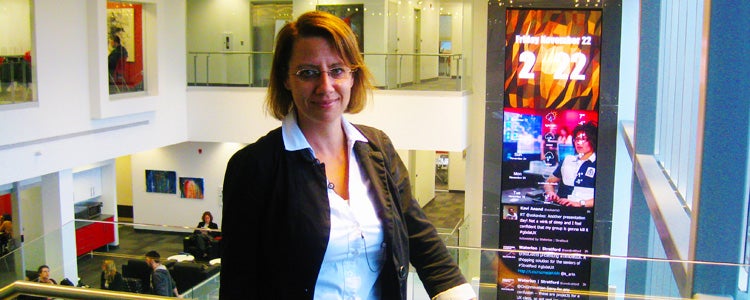
Christine McWebb, Director of Academic Programs at Waterloo's Stratford Campus
After teaching courses in French literature and culture for almost twenty years – first at the University of Alberta and then at Waterloo – Dr. Christine McWebb changed academic gears: she became the founding Director of Academic Programs at Waterloo’s Stratford Campus. There, one of the programs McWebb has developed with colleagues in the Faculty of Arts is a Master in Digital Experience Innovation. For instructors of that program, the most daunting aspect is perhaps its emphasis on creativity. After all, how does one teach people to be creative?
“Well,” says McWebb, “You can’t. But what you can do is create an environment that is conducive to creativity, and that’s what we’ve tried to do.” McWebb goes on to describe how the physical environment at the Stratford campus has been designed to include “collaboration spaces” on every floor of the main building, as well as 24 “project rooms” where students can work in groups. The glass doors of these project rooms facilitate fertile chance conversations: as students wander by and notice an interesting project on a whiteboard, they are encouraged to enter the project room and join in. As McWebb notes, “The teaching space and learning space extend well beyond the walls of the classroom.”
Additionally, the Digital Experience Innovation program fosters creativity by bringing together students whose undergraduate degrees are in vastly different fields. “We have computer programmers working beside artists, psychologists beside English majors and engineers, and that breeds creativity,” says McWebb. “They have to work together and see each other’s perspectives.”
The course that McWebb herself teaches in the Digital Experience Innovation program is entitled Media History and New Perspectives. Here, McWebb tries to nurture creativity by, as she puts it, “stepping back.” While she acknowledges that “there needs to be some lecture time when content is conveyed,” McWebb emphasizes that she usually tries to “take a step back and just let the learning happen. It’s quite interesting what comes out of discussions or out of assignments when you don’t hover and don’t give students too many instructions. Autonomy helps foster creativity.”
This term, McWebb gave her students the task of collaborating on writing a book, which was to be published using a digital self-publishing platform called CreateSpace. The students were separated into five teams, with each team writing a chapter on a topic such as crowd-sourcing or digital activism, and with McWebb writing the introduction. Each chapter had to feature at least two types of media other than text, such as infographics, video, or animation.
McWebb was delighted with how her students enthusiastically – and creatively – embraced the project. The students were pleased as well. “The project was one of a kind,” says graduate student Ahsan Riaz. “It was unique and innovative to produce something for the real market. And it was great to feel valued, with all of the students being considered as authors of that book. It was an exciting project for us all.”
Christine McWebb was interviewed by co-op student Sophie Twardus, Special Projects (Teaching Stories), CTE.
Read more Teaching Stories
Tip sheets
CTE has developed more than 100 Teaching Tips. Each one is a succinct document that conveys useful ideas and practical methods for effective teaching. Some of the Teaching Tips that are relevant to the strategies mentioned in this Teaching Story include the following: